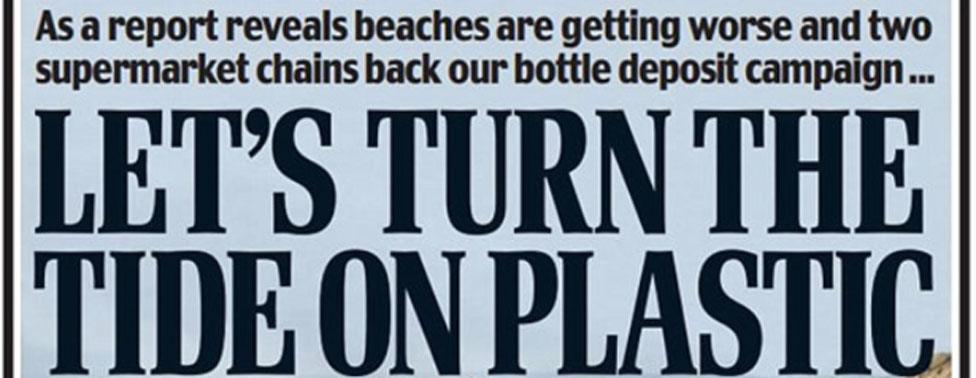Five ways Paul Dacre's Daily Mail left its mark on Britain
- Published

Paul Dacre is stepping down as editor of the Daily Mail, after 26 years at the helm of the UK's second-biggest daily paid-for newspaper.
Often controversial, always campaigning, the paper has millions of loyal readers, and more than a few in the corridors of Westminster.
In the words of Press Gazette editor-in-chief Dominic Ponsford, external it is the newspaper that, like no other, "echoes its master's voice".
So how has Paul Dacre, as one of the country's most powerful editors, left his mark on Britain?
1. Immigration
Under Dacre, the Daily Mail has become "Fleet Street's most influential force, external", the Financial Times's global media editor, Matthew Garrahan, believes.
The paper has set the news agenda even while being criticised for the tone of its coverage, he adds.
In particular, "the prospect of mass immigration" has "long been one of the paper's predictable drumbeats",, external notes Tim Adams for the Guardian.

One of the most talked about front pages described a "swarm" of migrants on Britain's streets - a phrase used by David Cameron in 2015 - while other headlines have linked immigration to pressures on housing, unemployment and crime.
A UN report into the press coverage, external of the European migrant crisis found the Daily Mail to have "exhibited both a hostility, and a lack of empathy with refugees and migrants that was unique".
But others on Fleet Street have commended the ability of Dacre's paper to tap into readers' concerns, and put immigration more firmly on the political agenda.
As the BBC's media editor Amol Rajan wrote, "he both channelled and shaped the conservatism of middle class Britain beyond London".
2. Brexit
"Some have argued that Dacre's and the Mail's influence has been so significant that it can be held more or less responsible for Brexit, external," the Independent's deputy editor Will Gore points out.
On 21 June 2016, two days before the referendum, the paper announced its support for Brexit, urging its readers to vote leave "if you believe in Britain".
It joined the Sun, Daily Express, Daily Telegraph and Sunday Times newspapers, with Fleet Street highly split on the issue.
Immigration, for so long a major cause for the paper, had become the main focus for Vote Leave in the final weeks of campaigning.

The then prime minister David Cameron urged the Mail's owner to sack Dacre over his pro-Brexit stance, BBC Newsnight revealed.
Dacre was said to be "incandescent" and his resolve to campaign for Brexit "stiffened".
But Dacre had the invaluable attribute of having no political friends, Melanie McDonagh wrote in the Spectator, external.
"That meant that he could approach most issues without the fatal handicap of not wanting to offend the people he knows."
The paper's pro-Brexit campaigning has continued since the vote.
Following the referendum, one headline labelled certain judges - who had ruled that Parliament must be consulted before Article 50 be triggered - "enemies of the people".
But new editor Geordie Greig has come from stablemate the Mail on Sunday, which strongly supported the UK staying in the EU. It is yet to be seen if the Daily Mail's stance on Brexit will change.
Big challenges facing new Mail boss, says BBC media editor
3. Campaigns
Dacre's campaigning has gone well beyond politics.
He is "the greatest campaigning editor of his era", former employee and columnist Andrew Pierce says.
One of his most significant drives was in 1997, when the Mail ran a front page featuring the faces of five men it named as Stephen Lawrence's "murderers".

Speaking to the BBC for a documentary on the case, Dacre recalled the decision process of that splash.
"We were doing something pretty cataclysmic," he said. "You trust your instincts, you go with what you think is right."
Stephen's mother Doreen said it "made everyone in Britain listen to us".
David Norris and Gary Dobson were finally convicted of murder in 2012, 19 years after the attack in south-east London.
In 2017, Sgt Alexander Blackman or 'Marine A' - the marine jailed for shooting dead a wounded Taliban fighter - was released from prison following a campaign by the newspaper.
Mail readers raised £810,000 to help fund Blackman's appeal, to get his murder conviction reduced to manslaughter.

But one of Dacre's longest-standing campaigns has been on the environment.
In 2008, he launched the Banish the Bags initiative to "clean up the country... and the planet".
The 5p levy tax was introduced in England in 2015 - which the paper heralded as a victory.
In 2017, the paper urged its readers to "Turn The Tide On Plastic" as it launched a bottle deposit campaign.
And earlier this year came the Great Plastic Pick-Up campaign - a nationwide litter-picking event urging volunteers to clear up public spaces.
In March, weekend editions of the paper stopped being wrapped in a polythene bag.
4. A newspaper for women
The Daily Mail is the only national newspaper to have more female readers than male, external.

Rarely does a front page not feature a picture of a woman, and double page spreads are regularly devoted to lifestyle and health features pitched at women, with Femail , externalcovering everything from parenting to plastic surgery.
"Empathising with women is much of the secret of the Mail's success," Dacre told the New Yorker in 2012, external.
Dacre has supported Prime Minster Theresa May and her leadership, but some do not credit him for his feminism.
"Never mind Brexit, who won legs-it", said the paper alongside an image of Mrs May meeting Nicola Sturgeon in 2017.
The piece inside - by columnist Sarah Vine - drew criticism of "moronic sexism" from Labour politicians, but the paper responded by telling critics to "get a life".
Other columns by Daily Mail journalists including Jan Moir have featured headlines such as "Glass ceiling? We've only ourselves to blame", prompting much debate.
However, as Hannah Fearn of the Independent wrote, external: "It might be an uncomfortable truth to many, but it is women who want to read (and often to write) such pieces."
5. Press regulation
During his editorship, Dacre has overseen a period of unprecedented change in the newspaper industry.
He was among those to object to the system of regulation of the press recommended by Lord Leveson.
The Mail called the Leveson Inquiry - set up by David Cameron to look at the culture and ethics of the press - a "sloppy piece of work, external".
Dacre argued self-regulation was the "only viable way of policing a genuinely free press".
He will remain at the Daily Mail's publisher beyond November, as chairman and editor-in-chief of Associated Newspapers. In his resignation letter, he said of the battle against statutory regulation of the press: "I plan to continue playing as great a part in it as ever."
- Published7 June 2018

- Published6 June 2018